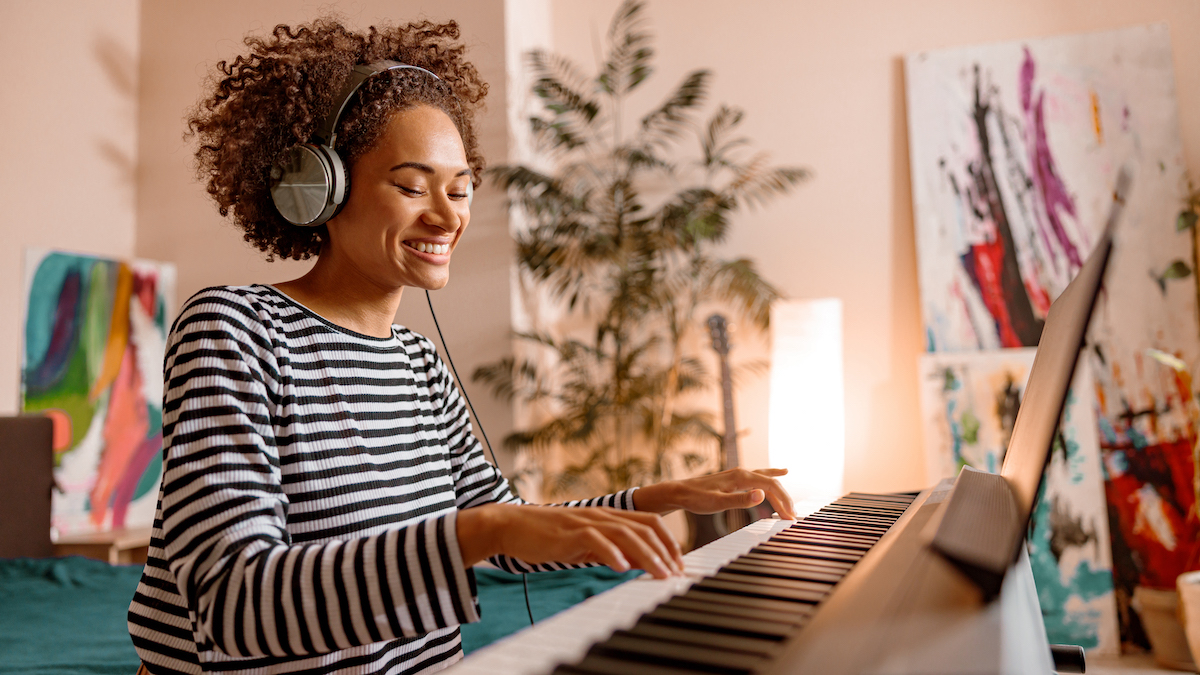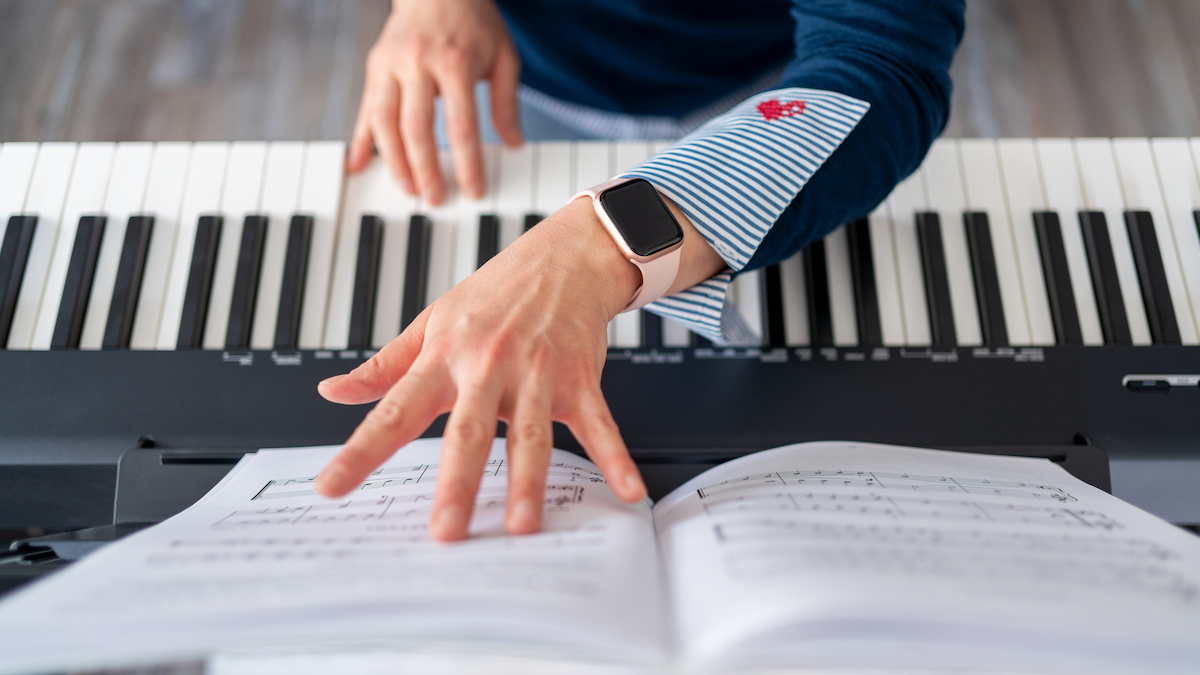
If you’re considering learning an instrument then the piano is a great bet as it offers so many benefits. Research has shown that playing piano can improve your intellect and is advantageous for your mental health. For budding young musicians, it’s proven to boost cerebral development, while for adults playing piano can increase memory, hand eye coordination and even slow down the ageing process.
If you’re looking to break into the music industry or simply start writing your own music, then knowing how to play the piano is a valuable skill to have under your belt. The piano's wide range of notes and versatility has made it an essential tool in music production and composition. Plus learning to play your first tunes on the piano won’t test your patience the way other instruments might and you won’t have to dedicate a whole soundproofed basement to your craft! Instead an electric keyboard or digital piano in your bedroom and a simple pair of headphones will do the trick.
1. It’s great for your mental wellbeing
In this ever changing world where anxiety is on the rise and stress has become a daily norm, playing the piano might just be the kindest thing you could do for yourself. It has been proven to lower stress and anxiety levels and help with managing depression. When sat at the keyboard, not only do we give our mind something to focus on but we also allow it to let loose in a musical world.
Just like the practice of meditation, playing engages your posture, regulates your breathing and forces your mind to focus on the multitude of tasks it has to accomplish in order to play. The neuroplasticity of the brain means it is ever changing and malleable. Regular piano practice can enhance cognitive abilities but also helps to rewire the neural pathways in the brain which can break the cycles of negative thoughts and promote positive ones.
Let’s not forget that the sense of achievement from learning an instrument is a great self esteem and confidence boost, which is always a plus when it comes to mental health.
2. It make your brain sharper and healthier
Science tells us that playing piano is like a workout for the brain. There are numerous studies showing that it offers a plethora of cognitive enhancements from improving brain capacity to sharpening problem solving skills. It can also improve brain speed and memory.
A 2022 study conducted at the University of Bath ascertained that people who practised the piano for one hour a week had an enhanced ability to process multi-sensory information. And these changes could be seen just a few weeks after the participants started to play.
3. It improves coordination skills
Sitting at a piano is no cardio workout, unless perhaps you feel the music the way the enthusiastic pianist Lang Lang does, however it does have some great physical and physiological advantages.
Regular piano practice will help to improve important motor strength in your fingers and your hand dexterity. As you read this, wiggle your fingers. They may feel stiff, but you will notice as you play that your fingers will become more nimble and your hands will feel less tense.
Playing the piano is beneficial for hand-eye coordination, too. The reading of music and the process of translating this to hand movements is the ideal activity for training this muscle.
Playing music also helps to regulate respiratory rate, although there may be a little huffing and puffing when you start out, soon you will find that your breathing will sync up with your playing. Slower breathing often results in lower blood pressure and can increase immune response.

4. It’s beneficial for development in children
Learning an instrument at a young age has been proven to help children with cerebral development. Respected Harvard professor Gottfried Schlaug has observed through several studies that young musicians have a more developed brain capacity and corpus callosum (the fibres in the brain that connects the left and the right sides) than non-musicians. He found this was especially noticeable with musicians who play instruments, such as piano, that require coordination between both hands and feet.
5. It slows down ageing (no, really)
Taking up the piano at a later age has many benefits in maintaining a sharp and healthy brain. As well as improving skills that typically diminish in old age such as hand-eye coordination, recent studies have shown that playing the piano boosts the production of a hormone called Human Growth Hormone (hgh). This magical hormone can reduce the speed at which we age.
6. It’s a sociable instrument
When we think of a piano player we often imagine a broody 19th century romantic and tortured artist alone at their instrument. However the piano and its keyboard based relatives are present in most musical ensembles. As a player, you can be part of many formations, making the piano a great sociable instrument to learn. The piano’s versatility means it's also present in a vast range of genres. From simple Jazz trios, to symphonic orchestras, travelling through all sorts of pop bands, synth based electronic groups, R’n’B soft Rhodes chords and soulful organ tunes - you name it, the keyboard is everywhere!
It’s the instrument that will accompany singers and violin players, but also choirs and ballet rehearsals. So if you're looking for a musical community then playing the piano is a great way to meet new people.
7. The piano is the gateway to composing
It is rare to meet a composer that doesn’t know their way around a piano. In the times before virtual instruments and sample pack libraries, composers would create what we call a piano reduction before bringing their composition to players. Meaning that the entire symphony would be written and simplified into an arrangement that could be played on a piano. Even musicians renowned for composing pieces for other instruments first took to the piano to write them: when J.S. Bach wrote his famous Chorals for church choirs he most likely wrote them on the organ, while legendary trumpet player Miles Davis was a keen piano player which helped him when arranging for his band.
The 88 keys of a piano spread across more than seven octaves meaning it's possible to play everything from basslines to top line melodies. The piano is a chordal instrument so can play multiple notes simultaneously, this means it's possible to build chords and arpeggios, ideal for accompanying other musicians.

8. …and a great first step to producing
If you want to write, produce and release your own music into the world, these days you can do this with just a laptop or an iPad and a MIDI controller i.e. a keyboard connected via USB. It might seem simplistic, but it’s how most professionals work. Visit any producer’s studio and you will find, sitting proudly in the middle of their desk, a keyboard. Once connected up to a computer a keyboard becomes a tool to trigger countless virtual instruments, making it possible to play and record synthesizers, strings, guitars, choirs, and even drums by pressing keys on the keyboard. Basic understanding of piano playing, how to build chords, melodies and basslines has become an essential skill for music producers in all genres.
9. It’s an ideal instrument for beginners
The piano is a straightforward instrument to play. Unlike brass, woodwind or other string instruments that require learning a complex technique in order to get a sound from them, playing the piano - on a basic level - is as simple as pressing a key, making it easy for beginners to pick up. It’s also a versatile instrument and whatever music genre you enjoy playing the piano will always fit.
Pianos come in a range of sizes, from massive grand pianos to compact beginner keyboards. If you're short of space an upright electric piano or keyboard is a great option, while a statement piano will serve as an elegant piece of furniture. Of course the other benefit of electric pianos and keyboards is that you can control the volume or even play with headphones on; ideal if you’re starting out and don’t want to irritate your neighbours. For accomplished players a piano can become the heart of the party where a jolly old sing-along makes for a joyous celebration.

.jpg?w=600)





